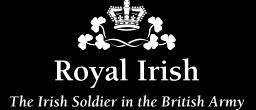Battle Honour BARROSA
 The Battle Honour BARROSA is emblazoned on the Regimental Colours of The Royal Irish Regiment. The Battle of Barrosa is marked each year as a Regimental Day in The Royal Irish Regiment.
The Battle Honour BARROSA is emblazoned on the Regimental Colours of The Royal Irish Regiment. The Battle of Barrosa is marked each year as a Regimental Day in The Royal Irish Regiment.
In each Officers Mess, the story of the battle is retold in contemporary terms by a young subaltern, often dressed in costume of the period - or at least a homemade version of it. During the course of the Barrosa Dinner, a toast is drunk to the memory of the men of the 2/87th who won such glory on 5 March 1811. It is from the Battle of Barrosa that the Regimental motto, Faugh-a-Ballagh (a corruption of Irish (Gaeilge) for ‘Clear the Way') originates and was used as the nickname (Faughs) for The Royal Irish Fusiliers, as the Regiment was later retitled.
The battle opened when the Anglo-Spanish Army’s commander, General Manuel de la Peña, ordered three of his brigades to attack the French, at the same time ordering General Thomas Graham's division to advance from the heights of Barrosa, the key feature of the area. Realising his opportunity, the French Commander, Marshal Victor, attacked the small rearguard that remained on the key high ground.
Graham, whose troops were marching through some pinewoods, realised what was happening and decided to counterattack the advancing French divisions. He formed up one brigade in line at the edge of the wood, the 2/87th being in the centre, where it advanced against the onrushing French column. At sixty paces, the British and French exchanged volleys and, although the British suffered some casualties, the effect of the concentrated British volley on the dense mass of French in column was devastating. The British continued advancing and, with bayonets fixed, charged.
The 2/87th, wildly shrieking 'Faugh-a-Ballagh', hacked and thrust ferociously at the shattered and demoralised battalions of the French 8e régiment d'infanterie de ligne which eventually lost 726 of their 1,468 men (figures vary in accounts), including their regimental commander, Colonel Jean Francois Etienne Autié and Lanusse, the commander of the 1/8e. The struggle between the 2/87th and the French 8e régiment had centred on the latter's 1/8e battalion standard, its staff surmounted by an eagle adorned with gold laurels. The laurels had been presented by Napoleon in person following the Battle of Talavera.
Ensign Edward Keogh and Sgt Patrick Masterson rushed against a group of French officers and non-commissioned officers who were rallying around the symbol of their battalion. In the bloody fight Keogh was killed and the French standard bearer, Lieutenant Edmé Guillemain*, felled. Masterson caught the standard and, despite French attempts to recover it, held onto it throughout the subsequent melee.
The battle was not yet over. The French 45e régiment, intact and fresh, was seen approaching the Faughs’ right flank. Major Gough, commanding the 2/87th, with the greatest of difficulty collected the right wing of the Faughs from the confused hand-to-hand fighting, and charged the advancing 45e. Luckily for the 2/87th, the French, unnerved by the Faughs' savagery against the 8e régiment, broke and fled.
This marked the end of the battle** for the weary Faughs; all the British troops were too tired to pursue and harry the withdrawing Frenchmen. During the battle, the Faughs lost one officer (Keogh) and forty-four men; a further 128 all ranks were wounded out of a total strength of 722. The 2/87th earned high praise for their part in the battle:
'General Graham met us on return, shook hands with Colonel Gough, halted the Regiment and thanked them for deciding the fate of the day.'
Later, the Prince Regent awarded the 87th Regiment the title of ‘Prince of Wales’ Own Irish Regiment’ and directed that that they should bear an eagle on their colours and other appointments in recognition of the capture of the very first French ‘Eagle’ taken in battle by the British Army.
*
We now know that Lieutenant Edmé Guillemain was wounded and survived the battle without being taken prisoner and went on to serve after promotion until pensioned.
**
The site of the Battle of Barrosa is also known by its Spanish name of Chiclana de la Frontera.









